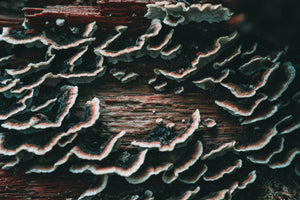ANCIENT EASTERN SUPER MUSHROOMS MAKING THEIR WAY WEST?

For thousands of years, medicinal mushrooms or “functional mushrooms” have been consumed in Eastern medicine for their benefits beyond essential nutrition, but only recently have they been recognized in the West for their powerful health benefits. Due to this recency, more scientific research is needed to confirm the effects of functional mushrooms on human health, but we can rely primarily on animal studies, some human studies, a tradition of use, and personal experiences to prove their effectiveness while more clinical studies are being completed.
Functional Mushrooms are accepted as immune-boosting foods, and may offer benefits beyond basic nutrition including physical and immune health, cognitive health, and regulating the effects of stress on the body. These super mushrooms also have the potential to support energy levels and aid digestion. Some mushrooms are widely available and can be easily prepared as a food, like Shiitake, while other less accessible ones are available as powders or extracts, smoothie powders or pills. You can also have your mushroom and coffee intake all in one. Whatever form, incorporating functional mushrooms into your diet is something to consider for nutritional benefits alone; as they are packed powerfully with essential vitamins, minerals, polysaccharides, beta glucans, antioxidants, amino acids, and prebiotics to support a well rounded diet.
Here are 7 commonly consumed functional mushroom types and their respective purported health benefits, so you can decipher which you may want to add to your diet:
Lion’s Mane (Hericium erinaceus)

Lion’s Mane is known primarily for its anti-inflammatory benefits resulting from its antioxidant activity, which may offer dietary support to those with diabetes, autoimmune diseases, inflammatory bowel disease, or depression. In addition, Lion’s Mane may improve cognitive functions, boost the immune system, and improve heart health. Studies in mice show how Lion’s Mane promotes nervous system recovery, and potentially fights certain cancer cells. Many of these claims, however, have yet to be studied with humans, but have had success in animal and in-vitro testing. Try some mushroom coffee with Lion’s Mane for an easy way to incorporate it into your daily routine. (1)
Cordyceps (Ophiocordyceps sinensis)

Cordyceps has a variety of benefits, most often consumed for natural energy and respiratory health. It may also serve as a cholesterol reducer, anti-inflammatory, and antioxidant. Due to its anti-inflammatory and antioxidant effects, Cordyceps may lower blood pressure by improving circulation and also loosen airways to provide asthma relief. Additionally, Cordyceps has been found to trigger apoptosis with breast and colon cancer cells along with leukemia cells in test tubes. (2)
Turkey Tail (Trametes versicolor)

Turkey Tail is most well-known for its immune enhancing benefits. This is due to its antioxidant activity, polysaccharopeptides, anti-tumor properties, and prebiotics that promote gut health. Turkey Tail contains phenol and flavonoid antioxidants, which reduce inflammation and promote the release of protective compounds. Two types of polysaccharopeptides found in Turkey Tail are Krestin (PSK) and Polysaccharide Peptide (PSP). PSP increases the amount of white blood cells that fight infection (monocytes), and PSK promotes immunity to toxins and regulates the overall immune response. (3)
Shiitake (Lentinula edodes)

Shiitake mushroom benefits include its anti-bacterial, anti-tumor, immune enhancing properties, and it may also improve skin health, energy levels, and overall cardiovascular health through cholesterol reduction. Shiitake is able to affect tumor growth by inducing apoptosis, similar to other functional mushrooms. It is also rich in B vitamins, which support the transformation of food into energy along with hormone balance. As for skin health, shiitake mushrooms contain selenium which helps prevent and heal scarring from acne. (4)
Chaga (Inonotus obliquus)
Chaga, often referred to as the king of medicinal mushrooms, supports the immune system through its potential anti-inflammatory, anti-bacterial, anti-viral, and anti-tumor properties. Taking chaga may help fight infections because of its ability to stimulate white blood cells, and it can reduce inflammation, potentially reducing risk of developing certain diseases or providing relief if already present. (5)
Reishi (Ganoderma lucidum)

Reishi has many purported health benefits, including high antioxidant activity, anti-tumor properties, immune boosting properties, and cardiovascular health. Similar to other functional mushroom benefits, it has been used for immune purposes in Eastern medicine for centuries likely because of their effects on white blood cell activity. Further, it has the potential to boost the immune system through anti-inflammatory, antioxidant, anti-bacterial, and anti-viral properties. (6)
Maitake (Grifola frondosa)

Maitake mushroom benefits stem from its purported anti-tumor and immune boosting properties. Studies in mice and rats have shown that Maitake mushrooms can reduce cholesterol and improve glucose levels to aid those with type 2 diabetes. Lastly, because of its antioxidant activity and vitamin-rich nature, Maitake may be able to enhance the immune system. (7)
Clearly, incorporating functional mushrooms in your diet has the potential for many health and nutritional benefits, and this is idealized when two or more are working in conjunction (“synergistically”). However, more research needs to be done to back up these claims and further understand the effects of including functional mushrooms in our diets and daily routines. Simple ways to add these super mushrooms into your diet are by taking them as supplements in pill form, adding them to your foods and drinks in powder form, or by drinking already infused cold brew mushroom coffee and mushroom coffee beans.
Want to start including these 7 functional mushrooms in your diet? Check out what Peak State is doing to help you incorporate functional mushrooms into your daily routine and discover what mushroom coffee tastes like.


